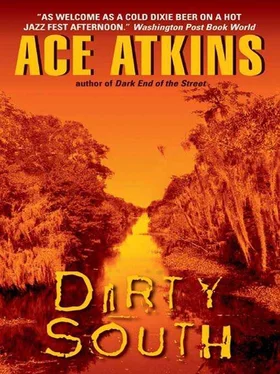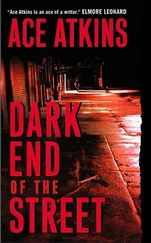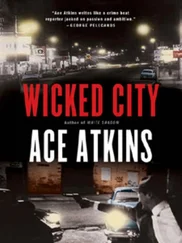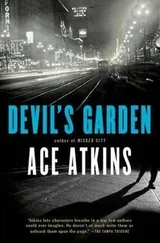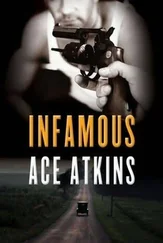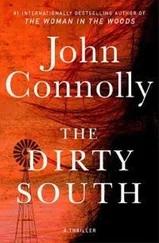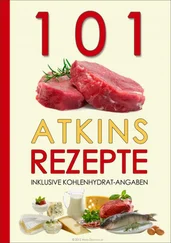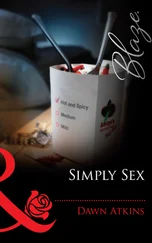I decided to cut back through the old district, before the streets became flooded with cars and tourists. I jogged my way down Royal Street, looking up at the scrolled ironwork on JoJo and Loretta’s old apartment, and wound my way around a street musician who used his dog to pick up tips with its mouth.
I wondered if Annie could do that.
She’d probably take the cash and then piss on their foot.
I slowed, made a couple of cuts, and found myself at the old Woolworth’s and a blank stretch of Bourbon. Where Bourbon met Canal, I heard a brass band of teenagers running through the standard “Somebody Is Taking My Place.”
Trombones and trumpets. A skinny kid with an overpowering dented tuba.
All of them were black and wearing T-shirts and shorts.
A little girl, about four, walked around with a shoebox filled with loose coins.
I stopped. Caught my breath.
In the fading light of the day, all gold and dark blue, in this unremarkable little stretch of the Quarter, a half-dozen kids entertained about twenty people. They rolled through “Saints” and took a big finish with some really wonderful solos.
Just when you grew to hate New Orleans with all its dark places and overwhelming violence, you saw something like a bunch of ragtag kids making some spectacular music. I wondered about the violence and the art and how it all fit together.
I felt bad when the little girl walked past me and I didn’t have change in my jogging shorts. I showed her my empty palms and shrugged. She scowled and turned her back to me.
Suddenly the band broke into a song I knew. A heavy funk with the tuba working the hell out of the beat.
I started tapping my foot, the light fading to black all around us.
My smile stopped. My face flushed.
They were playing ALIAS.
I SPENT THE NEXT MORNING at the New Orleans Police Department flipping through the missing persons file of Calvin Antoine Jacobs, aka Dio. In the empty office of a desk sergeant who was friends with Jay, I made notes onto a yellow legal pad. I read through interviews with Teddy and Malcolm, other rappers who knew Dio, and a couple that saw him taken away outside Atlanta Nites by two men in ski masks. One reported he heard a muffled pop from inside a black van. I read back through the interview with Malcolm. He talked about the man’s talent and some folks in Calliope he feared. The name Cash was mentioned several times. But Malcolm was their suspect.
Still nothing. Not what I’d hoped to find.
Jay popped his head in and asked if I wanted to go to lunch at Central Grocery.
I declined.
“You must be sick,” he said. “Life is a bag of Zapp’s.”
“This report doesn’t make any sense,” I said. “It just kind of drops.”
“When someone goes missing, not a lot you can do, bra. You know how many people just disappear in New Orleans every year?”
“You know how many should?”
“You heard from that street freak that was harassing you?”
I shook my head.
“Look out for yourself,” he said.
I peered down at my legal pad and some notes I’d made. About thirty minutes later, I found a vending machine and drank a Barq’s. I ate some Oreos. I walked down a linoleum hall and let myself back into the records room.
What bothered me was that no family members had been interviewed about this guy. When I researched someone, often that was the first place I’d go. Who knows someone best but his own people?
I asked the sergeant – a burly white-haired man who kept a screen saver of George W. Bush on his computer – for an explanation. He stood, his back to the thin walls of pressed wood, where he’d hung photos of himself with three German shepherds sitting at his feet.
“Was he a transient?” he asked.
“No.”
“Who’d we find?”
“People he worked with.”
He nodded.
“He has an address that shows a place on Lakeshore Drive,” I said. “But I know he’d been in prison. Why isn’t there anything about that in the record?”
“You need to call the Department of Corrections for that,” he said. He flipped through a Rolodex, squinted at the tiny card, and read off a name and number. “She’ll get you what you need. Tell her I told you to call.”
I shook the desk sergeant’s hand.
“Good when you can do something,” he said.
“Did you work the street for long?”
“Long enough to piss someone off and end up here.”
The contact from the Louisiana Department of Corrections was a pleasant woman named Lisa. She sounded completely foreign to the Lisa I’d lived with when I played ball. She sounded as if she had a heart. A brain too. I told her the sergeant’s name and that I was researching for a buddy of mine and she told me to give her a few hours.
“Some inmate at Angola escaped this morning,” she said. “Those freakin’ reporters won’t leave us alone.”
I drove back to the warehouse and walked Annie down to Louisiana Products for a po’boy. I made coffee.
At 3, she called back.
“I have two Calvin Antoine Jacobses,” she said. “The first has a DOB March 3, 1974?”
“Let me double-check that birthday.”
“Is he currently incarcerated?” she asked.
“No.”
“Then that’s not him. The only other Calvin Antoine Jacobs I have in the system died two years ago.”
“This guy I need is missing,” I said. “No one ever found him. I didn’t think he was ruled dead.”
She paused for a second. “This guy died in Angola. Let me see… he was from New Orleans. Lived at 2538 Constance. He was convicted of two counts of manslaughter and one count of car theft in 2000.”
“Wait.”
“What?”
“I think I love you.”
“Excuse me?”
“Read back that address.”
She did. I smiled.
I promised her free drinks at JoJo’s next time she was in New Orleans. Anything she wanted. My children. My dog. She could be bald with a harelip and I would’ve kissed her at that moment.
“What else can you tell me about Mr. Jacobs?”
“A lot,” she said. “What do you need to know?”
I WAS DOWN ON CONSTANCE an hour later passing a little neighborhood grocery, Parasol’s Irish bar, and rows of old shotguns until I found the one where Dahlia lived. I parked a block down the street, slid on The Club, and walked down the skinny broken sidewalk and under shady oaks to her door. I knocked. No one answered. I found a place to sit on her small porch, the deck wooden and uneven. I sat for a while, wilting in the heat. I walked back to my truck, stopped, and went back to the house. A warped gate closed the way to the back of the shotgun. It was locked.
I looked down the street and then back the other way.
I hopped the fence and followed a stone path covered in pink bougainvillea that grew over a fence and rotted awning. On the shaded back patio, white and purple impatiens hung from large baskets. In the deep shade, I recognized some yellow jasmine growing from iron grillwork. The air smelled of musky sweetness that enveloped me.
“My mother loved them,” she said.
Dahlia smiled at me, hands covered in white gloves and mashing potting soil into a terra-cotta pot. She wore a boy’s white tank top covered in mud. The cotton hugged the perfect shape of her breasts and tiny waist. She ran her forearm over her brow.
Her dark hair had grown curly in the heat and her large eyes watched me, her jaw loose. Lips parted.
“You want to tell me about your brother?” I asked.
“Jesus,” she said. Smiling. “You don’t stop.”
“I think I have it all figured out, but why don’t you tell me.”
She tilted her head and wrapped her long brown hair into a ponytail. Her hair seemed moist and rich. I could smell her scent. She smelled like coconut oil and warm skin.
Читать дальше
